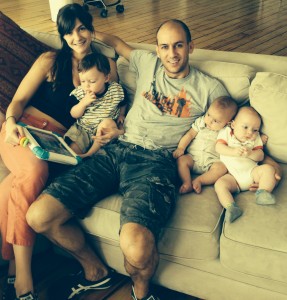“Efficiency is my passion.”
Ari Meisel, described by some as “the James Bond of productivity” and “the most efficient man alive,” knows how to do less and live more.
Ari heads Achievement Architecture, a coaching program that helps people overcome health challenges, build efficient time- and stress-management strategies, and, in sum, enables people to live the lives they want. His mission aims to empower via productivity and self-care and covers everything from inbox management and biorhythm-oriented work weeks to exercise techniques and virtual assistants. His blog, Less Doing, More Living, provides productivity tips and bio hacks aimed at “supercharging” your life.
Partly inspired by his life’s struggles with Crohn’s disease, this consultant/author/life coach/real estate developer/dad is the expert on optimizing, automating, and outsourcing almost everything in your life so that you can spend time doing the things that mean most to you.
Ari recently sat down for an interview with the The Greatist. Here are a few of his tips for leading a happier and healthier life:
Answer the simplest question first.

Before you get into “efficiency” or “organize” mode, make sure to do your soul-searching homework. At the root of feeling inundated or overwhelmed is a sense that we don’t have the time or capacity to focus on what’s important. That begs the question: what is most important to you?
“Somebody can come to me with a health problem or a productivity problem or a job problem. All of it boils down to the same thing,” Ari explains. “That person is not getting to do what they really want to do.”
Knowing this crucial element — what you want to spend your time doing — is the first step in organizing your life for optimal success and happiness. It’s the obvious but elusive truth: you have to know what you want before you can ask yourself to execute it. If you pinpoint your most honest objectives and desires, you can work backwards and plan for what will it take to get there.
Set measurable micro-goals.
Understanding your ambitions is crucial, but ambitions are not goals; they’re destinations (and often evolving, emergent destinations). A destination without a map, airline ticket, or budget is very difficult to get to — we need resources and reference points to help us get us from point A to point B.
According to Ari, people set really unrealistic goals — plotting a destination without considering what the journey might look like. We pile-up abstract, generic, and long-term ambitions when what we should be doing is creating achievable bite-sized goals.
Ari is a fan of small, specific, measurable goals that you can take immediate action on. These goals require no prerequisites because they are the prerequisites. Each brings you a degree closer to what you want and boosts your sense of momentum.
“I’m very big about setting micro-goals, or very, very small goals,” Ari says, “So for that person who needs to write a book, for me a goal would be write a hundred words. Progress is hitting those micro-goals.”
Frame tools as only tools.
Today, we stress over the tools we use to do our work: our anxiety builds as the phone rings non-stop and the inbox floods.
According to Ari, we have a tendency to use these tools in the wrong way. Tools in hand, we pack as much into our day as humanly possible — pushing our limits on number of emails sent, calls returned, meetings held — without getting to enjoy the experience and simultaneously allowing the stress to make us less effective.
To take control over our lives and where we want to go, we should put these tools back in their rightful place — the toolbox — and not allow them to weigh us down.
“People have to realize that email and cell phones are tool[s] for you to be able to communicate with your world. They are not meant to be a tool for the outside world to get a hold of you when they want.”
According to Ari, when you begin to approach these technologies as tools, using them in limited ways to make your life easier and accomplish micro-goals, you will enjoy the process of your work.
Appreciate the process.
Enjoying the journey requires a broader, longer view of success and efficiency.
Careers are long roads for those with big ambitions, and regular serotonin-filled moments of progress and accomplishment are critical for sustaining the journey. To find happiness along the road, you need to celebrate small gains and reframe success and efficiency around your ability to do what’s important to you.
“My definition of success is if you are better today in any single way than you were yesterday,” says Ari, “I look at efficiency in a similar way, that you can always do things smarter. Efficiency to me is that constant game of making things work for you.”
Take care of your mind and body.
Here we get to the crux of it all — why it’s important to do what you want to do, find success in small steps, unwind anxiety, and enjoy the day-in, day-out of the journey. At the end of the day, we are all human, with most of us living under the assumption that we only get one shot at this.
Mortality in check, we need to take care of ourselves.
While acknowledging that work and lofty ambitions are still out there, Ari advises his clients on how to take care of themselves, enabling them to better meet their demands and be happy while doing so. Emphasizing quality of sleep over quantity of hours in bed, a hyper-regular workout, a healthy diet, and space to clear the mind, he keeps burnout at bay.
“People deny themselves a lot,” says Ari, reflecting that without sleeping right, taking the time to eat, or giving your mind a rest, your ideas will stop. Progress will stall.
If you’re just GO, GO, GO all the time, Ari suggests, “You might be able to get something out of it — but you’re not gonna be able to reach your full potential that way.”
Source: The Greatist



